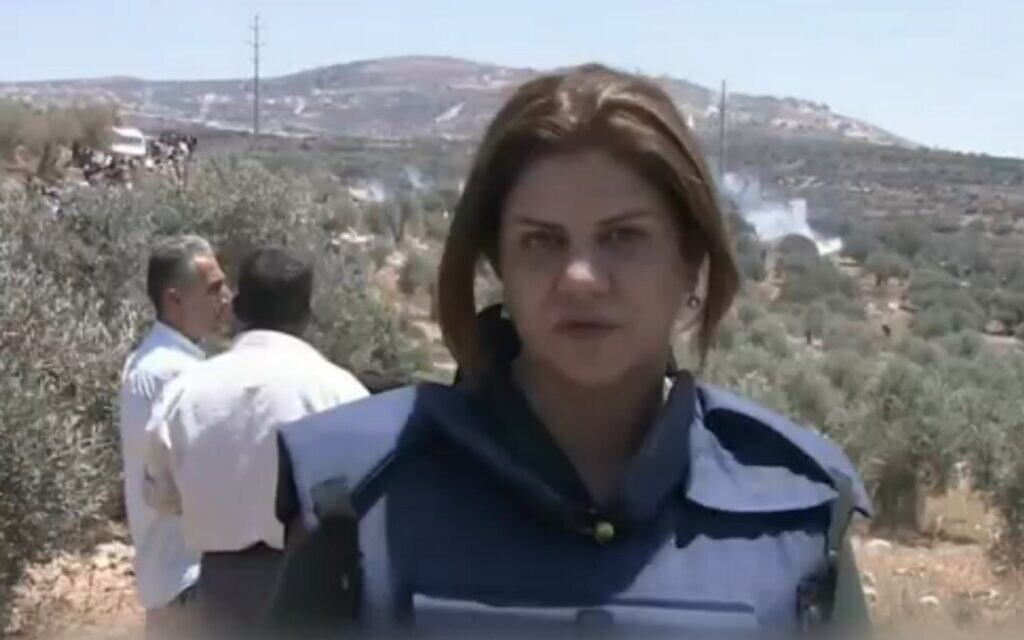Australia/Israel Review
Deconstruction Zone: It doesn’t matter who killed Shireen Abu Akleh
Jun 3, 2022 | Mark Lavie

It could have been me.
As a radio reporter for four decades in the Mideast, I was in the line of fire any number of times.
The most memorable incident, because I have it on tape, came in January 1988 in the Jelazoun Palestinian refugee camp, near Ramallah. I walked alongside Palestinians as they marched through their camp to the edge of the shantytown below the main highway. Then they started throwing rocks at the Israeli soldiers above.
The soldiers responded by firing tear gas canisters and rubber bullets at the demonstrators. On the tape, you hear me say: “Now the soldiers are aiming in this direction BOOMBOOM!”
The soldiers didn’t know I was there. Even if they did, they were too far away to see the large, colourful network logo on the tape recorder hanging across my middle. Luckily for me, I wasn’t hurt.
And if they had shot me, there would not have been a worldwide flood of condemnation of Israel and a defamation campaign reaching far and wide. Several of my colleagues suffered gunshot wounds back then. I was thrown to the ground by one police officer and tear-gassed by another around that time, for example. There was no US State Department condemnation of any of those incidents.
There are two reasons:
First, broadcast reporters have to be in the middle of the action, and though we’re trained to stay out of the way, sometimes we can’t. That’s the profession. Sometimes we get hurt.
Second, way back in the last century, there was no “antisocial media” to whip up a frenzy with amateur and/or fake videos and “evidence,” or just pure hatred.
That’s why it doesn’t matter who killed Al Jazeera reporter Shireen Abu Akleh in the Jenin refugee camp on May 11. These days, truth doesn’t matter. Saying that “my mind is made up, don’t confuse me with facts” used to be a joke-today, it’s a reality.
There are new rules (some would say no rules) in today’s media jungle. Dedicated, traditional reporters still play by the old rules of fairness, context and dispassionate analysis – but they are overwhelmed and outshouted by media playing to their target audiences (even once-respected, old-time publications) and outlets that make no such claims, shamelessly and quickly scooping up any piece of information, real or fake, to promote their cause.
Add to that the drive toward political correctness that limits what a reporter is allowed to say in the first place.
In recent days, there was a story about a bunch of people who attacked the doctors and nurses in a Jerusalem hospital ICU after another person died there. It wasn’t until nearly a full day later that local broadcast media hinted that the attackers were Arabs from east Jerusalem, and that the deceased died of a drug overdose.
Until then, listeners were left to guess who the attackers were, and left to speculate that perhaps the poor guy was killed by cruel Israeli soldiers or police – thus “justifying” the violence.
A few days later, there was a similar violent incident at a hospital in the northern Israeli city of Nahariya, and similar incomplete reporting.
Yet clearly those missing facts are vital for the understanding of the context of the event.
I left daily journalism in 2014 after years of fighting, and usually losing, battles with my colleagues over fairness and context. I was being cast as the “pro-Israel” element in my office, and that’s not what I signed up for when I became a journalist in 1963.
The worst case, was my agency’s refusal to allow me to report on my discovery of Israel’s 2008 peace offer to the Palestinians. “That’s not news,” my boss said.
I don’t write articles like this without suggesting solutions. This time there aren’t any easy ones. With antisemitism disguised as anti-Zionism (whatever that is in the 21st century) sweeping university campuses, promoted by groups that make up their own facts and “narratives” – two terms that basically mean the opposite of each other – attempts to respond with facts are comforting but mostly useless.
Mark Lavie worked as an Associated Press correspondent in the Middle East for 15 years, concluding in 2014. He worked as a radio reporter for National Public Radio (US), NBC, and the Canadian Broadcasting Corporation. He won the Overseas Press Club’s Lowell Thomas Award for “Best radio interpretation of foreign affairs” in 1994. © Jerusalem Post (www.jpost.com), reprinted by permission, all rights reserved.
Tags: Israel, Media/ Academia, Palestinians






